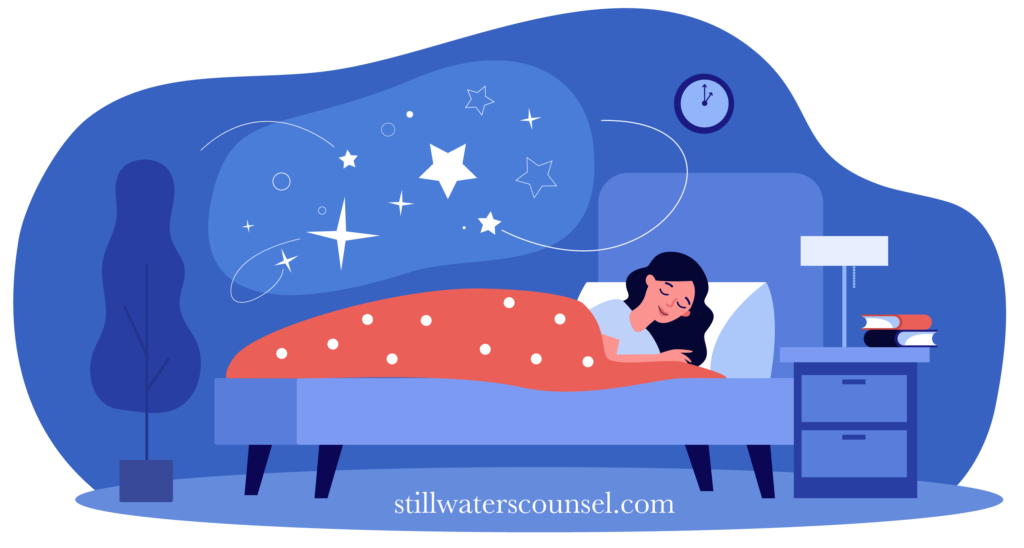It’s no surprise that sleep is a vital part of our overall health and wellbeing. During sleep our bodies repair and restore themselves, and our brains process and consolidate memories. This is also the time that metabolic wastes are ‘washed’ out of the central nervous system. The physical equivalent of clearing the counters, putting leftovers away, and clearing out the trash from the house at the end of the day.
For these reasons, adequate (to be clear, no, six hours is not sufficient), good quality sleep is essential for regulating mood, managing stress, and preventing mental health concerns like anxiety and depression.

To help you get in your zz’s here are some tips for good sleep hygiene:
1. Stick to a Regular Sleep Schedule:
Going to bed and waking up at the same time each day can help regulate the body’s natural sleep-wake cycle (i.e. circadian rhythm), leading to better sleep quality. And, yes, this includes days off (#sorrynotsorry).
2. Create a Relaxing Sleep Environment:
Again, no surprise here: cool, dark, and quiet bedroom promotes relaxation and, therefore, a better night’s sleep. Best practices include: using blackout curtains and removing all electronic devices such as smartphones and laptops from the bedroom to avoid disruptions. Bonus points for not looking at screens 30-60 minutes before bedtime! Side note: if you insist on screens, at the very least avoid media that is activating, i.e. social media, action movies, news feeds, etc.
3. Limit Stimulants/Substances:
Caffeine, nicotine, or alcohol close to bedtime disrupt sleep. Again, #sorrynotsorry. Either you’ll have difficulty falling asleep (hello cappuccino), and/or sleep cycles will be off (martini, anyone?) leading to a less than restful evening. It’s best to limit consumption or avoid these substances altogether, especially in the hours leading up to bedtime. If you must imbibe, give yourself at least eight hours between caffeine/nicotine and bedtime, and at least three or four between alcohol and bedtime. (Bonus tip: eat your last meal of the day at least 2 hours before bed to allow digestive processes to finish beforeyou go to sleep; this gives the nervous system all the resources it needs to do it’s thing and repair overnight.)
4. Avoid Napping:
While a short power nap can be beneficial, frequent or prolonged napping can disrupt the natural sleep-wake cycle, making it that much more difficult to fall asleep at night. And then get up in the morning… then you need another nap… you see how it goes…
5. Get Regular Exercise:
If ever there were a true panacea, it’s exercise. Regular movement (approximately 30 minutes, 5 days per week at sufficient intensity to make you short of breath) helps to regulate blood sugar, keep the feel-good chemicals circulating in your brain, relieve stress, keep your bones strong… and, of course, improve sleep! If you are able to get some movement early in the day, outside, bonus points for getting natural light in your eyes (and to your brain), which also supports your circadian rhythm, helping you keep that pesky steady bedtime and wake time with far less effort.
6. Practice Relaxation Techniques:
Meditation, deep breathing, journaling, prayer, yin yoga… whatever helps you get your zen on. Establishing a routine of any of these activities (and/or knowing which ones to pull out when you’re over the top stressed) can support your mind and body to come down into a relaxed, sleep ready space at the end of the day.
7. Engage in Some Hydrotherapy:
Body temperature naturally varies at different times of the day. It comes up at the beginning of the day (hello cortisol spike) and drops at the end of the day when it’s time to sleep. This is why having your room cool is helpful for sleep quality (and why there are more and more gadgets designed to at least help your mattress stay cool until the wee hours of the morning). You can drop your core body temperature on purpose with a warm bath, shower, or (if you’re exceptionally lucky) sauna before bed.
If you are struggling with the effects of sleep on your mood and ability to show up during the day, schedule an appointment with Dr Katherine Hofmann, who can help you come up with a bespoke plan to help!
